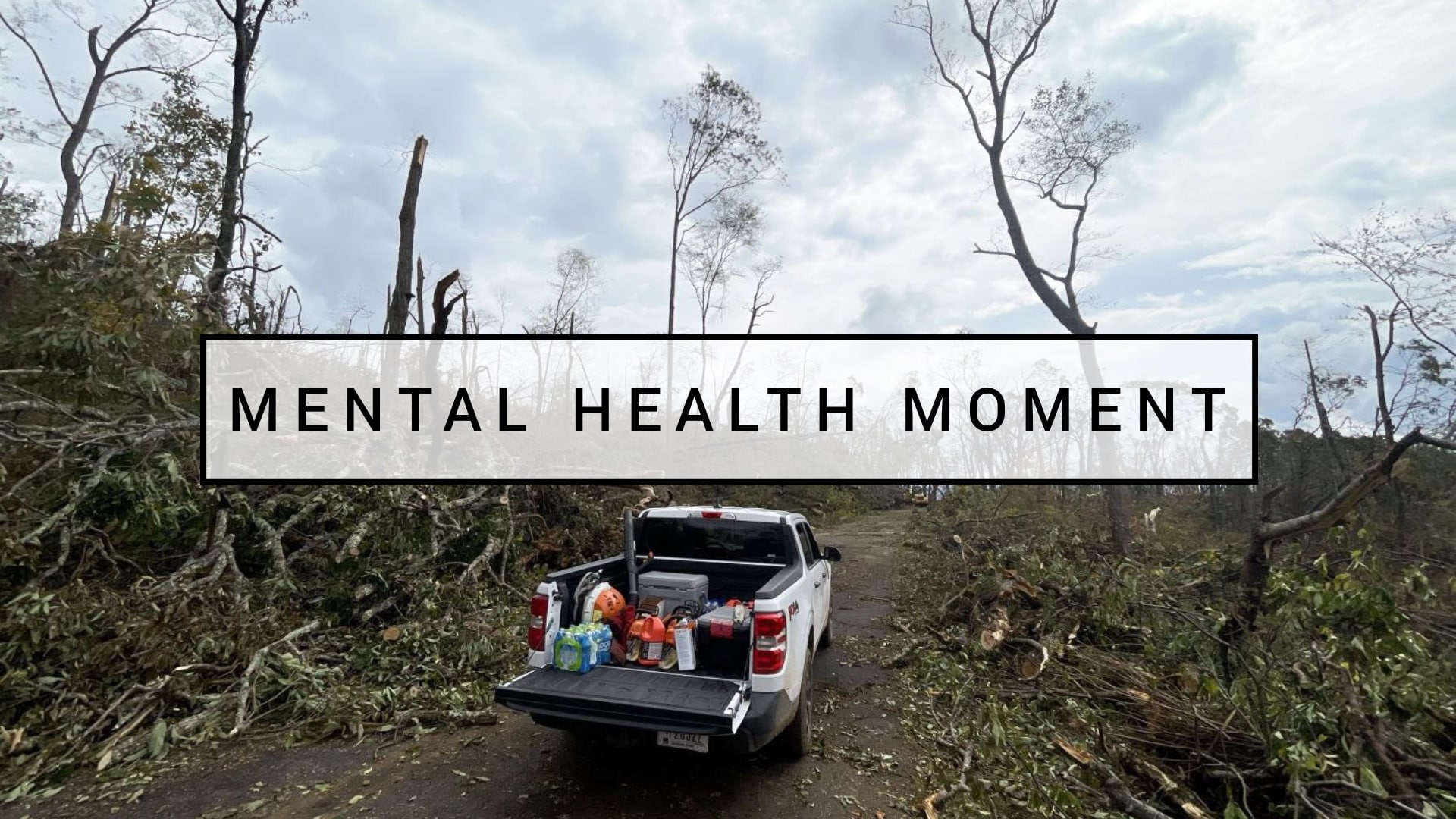
In the wake of Hurricane Helene, many in Western North Carolina are left grappling with the question: “What’s next?” The devastation, loss, and uncertainty can take an immense toll on mental health. While the road to recovery is long, there are essential steps we can take to protect our emotional and mental well-being during this challenging time.
Let People Help You—and Ask for Help
Even if you’re one of the fortunate ones whose home wasn’t severely damaged, you still need help. Make a list of small ways people can assist you—whether it’s a friend sending you a daily puppy video or someone offering a shower at their place. Allowing others to help can lighten your load and remind you that you’re not alone in this.
Adjust Your Expectations: Normal Will Take Time
Recovery from a storm of this magnitude is slow. While things like power and water may return sooner, a true sense of “normal” could take 18 months or longer, especially for those who lost their homes. It’s important to recalibrate expectations now—understanding that rebuilding your life and community will take time can alleviate some of the stress and frustration. Take it one step at a time and know that it’s okay to feel overwhelmed.
Acknowledge the Collective Trauma
The entire community is going through collective trauma, and no one is immune to it. Even the most resilient people will have moments of falling apart, and that’s okay. It’s crucial to face the trauma together, offering support, patience, and understanding as we all work through the emotional impact of the storm.
Practice Gentleness—With Yourself and Others
In times like these, gentleness is key. Be kind to yourself and to those around you, recognizing that everyone is doing their best to cope. You don’t have to have it all figured out, and it’s okay to take things slowly.
Watch for Signs of Struggle in Those Around You
One of the most significant pieces of advice learned from past storms like Hurricane Katrina is to be on “suicide watch” for everyone—even those who seem fine. After Katrina, many unexpected lives were lost to suicide and stress-induced health issues, beyond the official death toll. Check in with friends and loved ones, and encourage open conversations about how they’re really feeling. You never know who might need support.
Watch for Substance Abuse
Stress, trauma, and loss can lead to unhealthy coping mechanisms, including substance abuse. Be mindful of your own behaviors and those of your loved ones. If you notice signs of dependence, reach out for support early.
Be Cautious of Misinformation
After a disaster, misinformation spreads quickly—especially on social media. During Katrina, false reports caused confusion and hampered recovery efforts. Today, with AI and social media at our fingertips, it’s even easier for disinformation to spread. Before passing on rumors or unverified news, take a moment to think critically and seek reliable sources.
Limit Exposure to Screens and Disaster News
It’s natural to want to stay connected and informed, but constant exposure to videos and posts about the storm can take a serious toll on your mental health. Set time limits for how much disaster-related news you consume each day. Take breaks from screens, get outside, and create moments of calm for yourself away from the flood of information.
Redefine Work and Stay Occupied
Many people will face job loss in the wake of the storm, but finding small tasks to focus on can help you regain a sense of purpose. Whether it’s organizing your home, babysitting for a neighbor, or volunteering, staying occupied—even for just a few hours each day—can help your brain and nervous system recover from the constant stress of the disaster.
Don’t Make Long-Term Plans Just Yet
In the immediate aftermath of a disaster, your mind may not be in a place to make major life decisions. Right now, focus on the basics: taking care of yourself, your family, and your immediate needs. Long-term planning can wait until the dust settles and you feel more grounded.
Find Moments of Laughter
It may feel impossible to find joy amidst the chaos, but laughter is a powerful healer. Watch a movie that makes you laugh, read a book that brings you joy, or simply let yourself be silly. These moments of lightness can help carry you through the darker days of recovery.
Recovering from Hurricane Helene will take time, and the mental toll will be heavy. But if we come together, support one another, and take care of our mental health, we can rebuild stronger. We’ve seen the power of community in action, and together, we will get through this.
Useful Resources
All Souls Counseling Center is available to help. The nonprofit provider and community partner offers mental health counseling, outreach, and education with a focus on those who are under or uninsured. Anyone needing assistance can call 828-259-3369 and stay up to date with available resources at www.buncombecounty.org.
Text or call 988, or chat 988lifeline.org for free and confidential support. There is a Disaster Distress Helpline for those specifically impacted by or responding to disasters, including hurricanes: call or text 1-800-985-5990. In-person services are available at 130 Montreat Road, Black Mountain, 9 a.m.-6 p.m.
Other resources
NC Peer Warmline at 1-855-PEERS-NC to speak to a peer living in recovery from mental health or substance use issues
Hope4NC available for volunteers and first responders, 1-855-587-3463
VAYA Behavioral Health Crisis Line at 1-800-849-6127